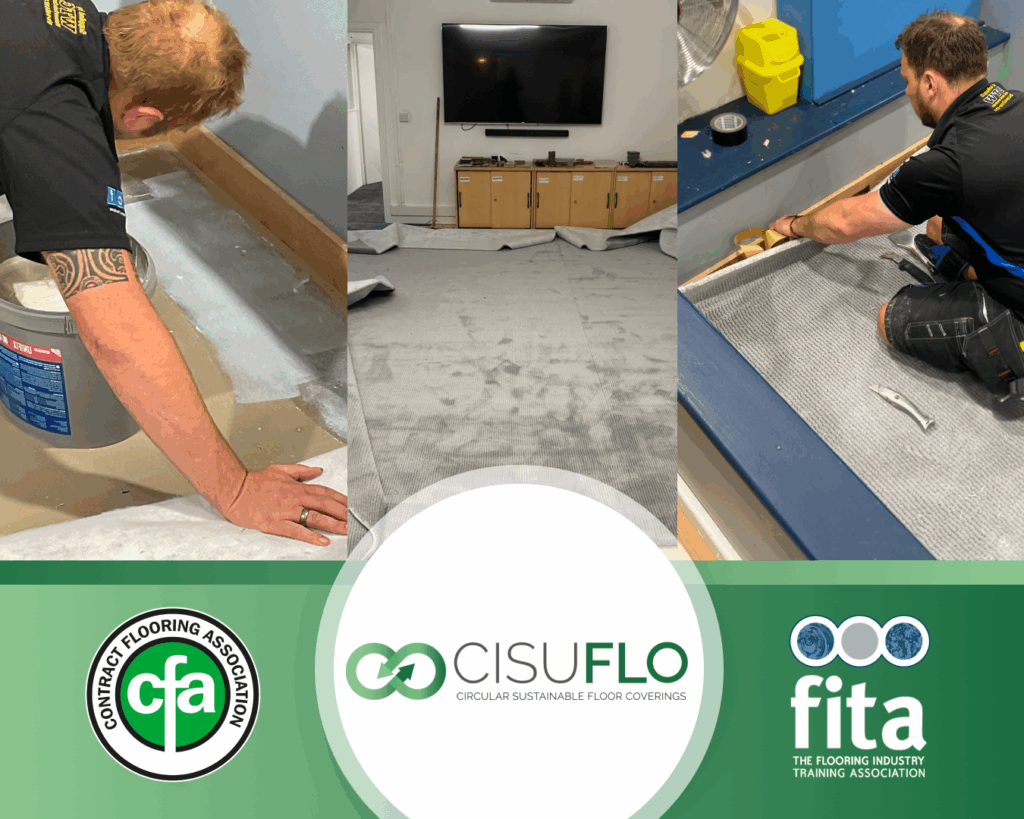
In the UK the CFA, alongside its training arm FITA, have played leading roles in CISUFLO (CIrcular SUstainable FLOor coverings), an international research project which has run from June 2021 to June 2025. The project has had the goal of minimising the environmental impact of the European flooring sector by striving for a systemic framework for circular and sustainable floor coverings, taking into account both technical feasibility and socio-economic factors. It focused on several ‘pilots’ to assess the circularity of floor coverings – including laminate, vinyl (LVT and vinyl flooring) and textile-based flooring (carpet and carpet tiles).

With CFA organising research and FITA conducting trials between May 2024 and February 2025, the UK has been a key player in the CTextile workstream, assessing the feasibility of monomaterial carpet manufactured predominantly out of polyamide 6 (PA6) – at least 85 wt% (weight percentage) to have an economically viable recycling process. While prototypes demonstrate success as a high-end domestic textile floor covering, more must be done to achieve viability for the commercial sector.
Throughout the research process, there was great engagement from CFA members, including contractors and manufacturers, as well as support from the CISUFLO workstream including Edel Carpets and Aquafil.
Alternatively, in some cases a separation layer based on a thermoplastic adhesive can be included in the carpet product, so that at end-of-life heat can be used to separate the primary and secondary backings, enabling them to be diverted to the corresponding recycling streams.
The CLaminate workstream involved rebuilding a Unilin laminate pilot in France into an industrial line to extract wood fibres using a steam explosion process and recycle them to produce new high density fibreboard (HDF), which in turn provides a base board to produce new laminate flooring. The resulting wood fibres can replace virgin fibres industrially in a range of 3 to 5 wt%. The plant aims to launch officially by the end of the year, greatly increasing capacity – a significant achievement in this timeframe.
In the CVinyl workstream, it was found that in order to introduce recycled content into the usual plastisol coating process, a particle size of smaller than 300 µm is necessary, and no greater than 2 to 3 wt% recycled content can be included. By using bio-circular PVC instead of virgin PVC in one product range, a carbon footprint reduction of 40% could be achieved. With loose lay installation using double-sided tapes, this material could be 100% recycled after use.
Tagging methods were widely explored during trials. This information is to be managed and identifiable by an app called ePRODIS (Electronic PRODuct Information System), allowing end-of-life floor coverings to be identified for recycling. Though tags could be read at end-of-life in trials, further consideration must be given to the logistics.
CISUFLO brought together 19 partners from across research, industry and trade association backgrounds in seven different countries with 32 voluntary supporting parties. Contributing to the United Nation’s Sustainable Development Goals, the project secured funding from the European Union’s Horizon 2020 Research and Innovation Programme.
Looking to the future, CISUFLO has provided clear outcomes to be carried forward for sustainable floor coverings and supply chains, plus identified challenges so that the flooring industry is better prepared as it continues to progress. The final report, available online, provides critical insights to benefit the whole flooring industry, from manufacturers to installers.
Other key deliverables include a white paper proposing a strategy for implementing industry-wide collection schemes for the flooring industry; an overview of relevant standards, certificates and labels; and a preliminary policy briefing.
CISUFLO’s findings build upon the need for a circular flooring economy outlined in the CFA’s Zero Avoidable Waste in Flooring scoping study (2021). As the report explores, the demand for a circular economy “goes beyond recycling and brings to the forefront a fundamental re-think in business models to ensure that products and services provide maximum benefit with the minimal impact on resources.” By assessing how circular flooring innovation could work at industrial scales, CISUFLO has been a crucial step to help bring this vision to life.
Richard Catt, chief executive officer at CFA, says: “A major milestone this year has been the conclusion of CISUFLO, a four-year European-funded initiative in which CFA and FITA played a role. A key takeaway was the industry’s need for collaboration and coordination to implement circular solutions – echoing CFA’s Zero Avoidable Waste report from 2021.”
Ine de Vilder, research scientist at Centexbel and project coordinator of CISUFLO, says: “The project has helped to lower the risks for the companies involved, by providing resources to enable a thorough investigation of what is feasible. It has enabled cooperation, which is the way progress is going to be made.”
Shaun Wadsworth, CFA and FITA training manager, says: “As installation must work together with manufacturing for new products and processes to work, being able to coordinate with the supply chain and provide our feedback has been an incredibly rewarding exercise.” He continues: “The groundwork so far has been very positive. I am interested to see how market innovation will continue with the lessons of the CISUFLO project.”
Find more information about CISUFLO: www.cisuflo.eu
Download the deliverables: www.cisuflo.eu/download2/public-deliverables/